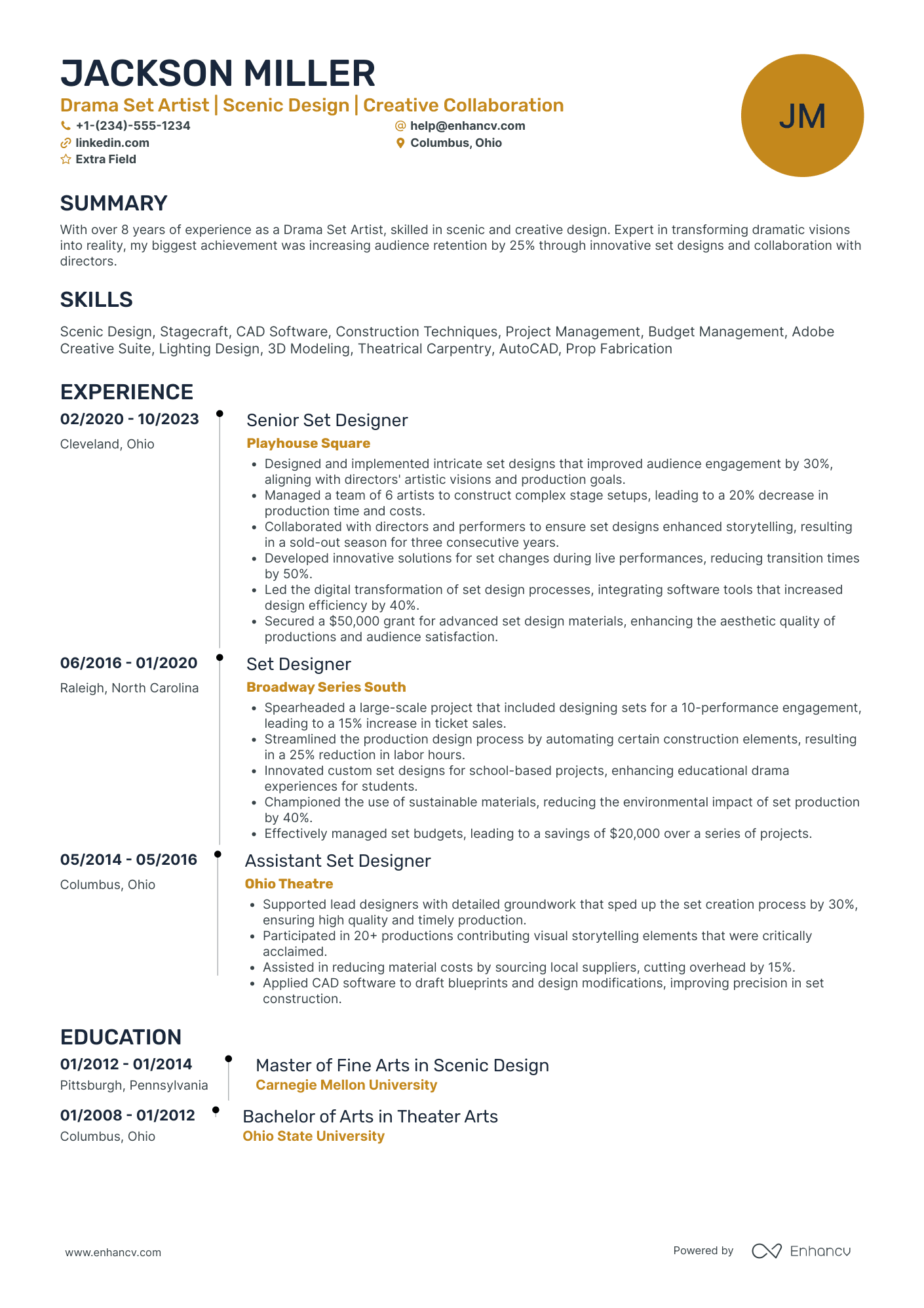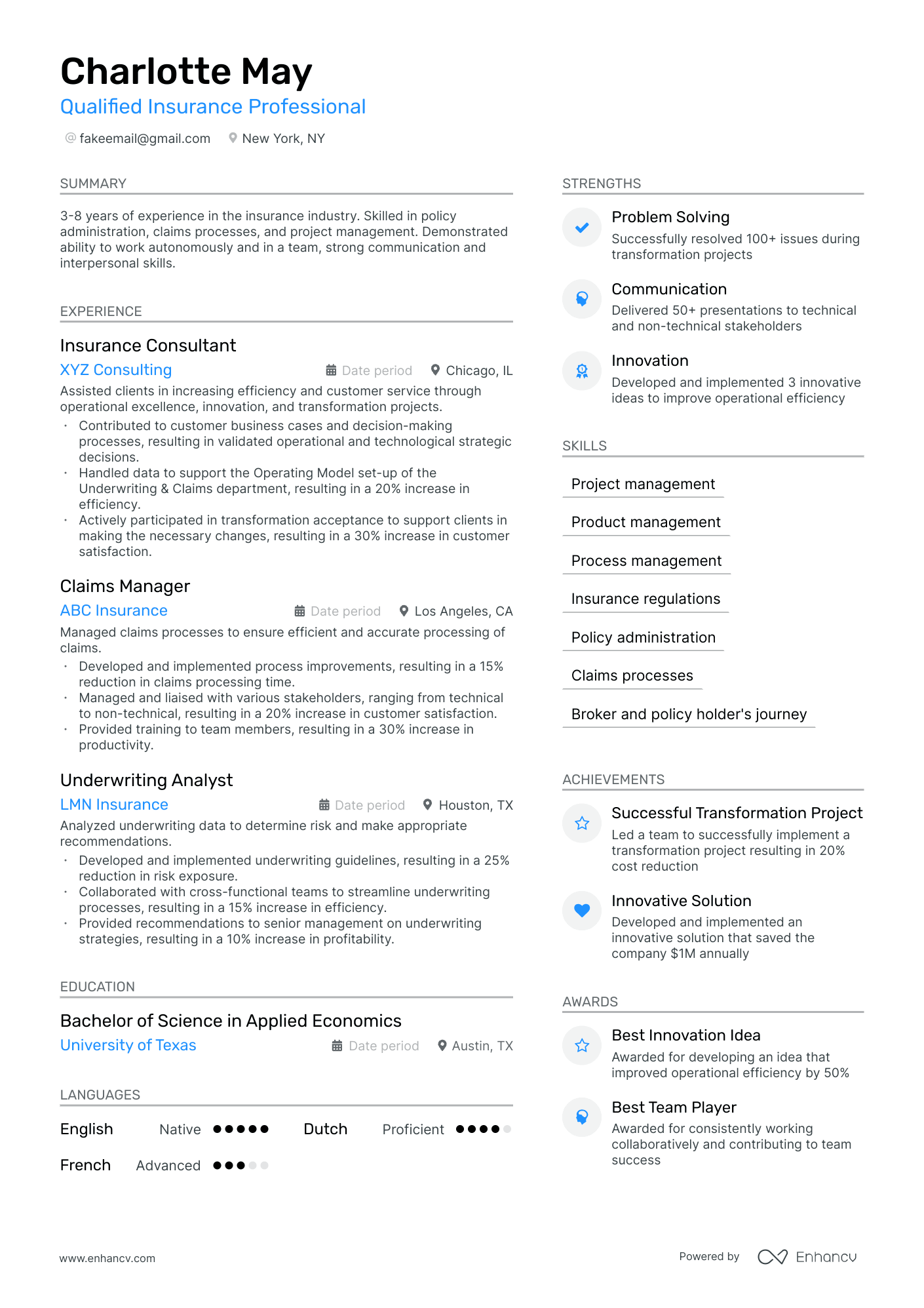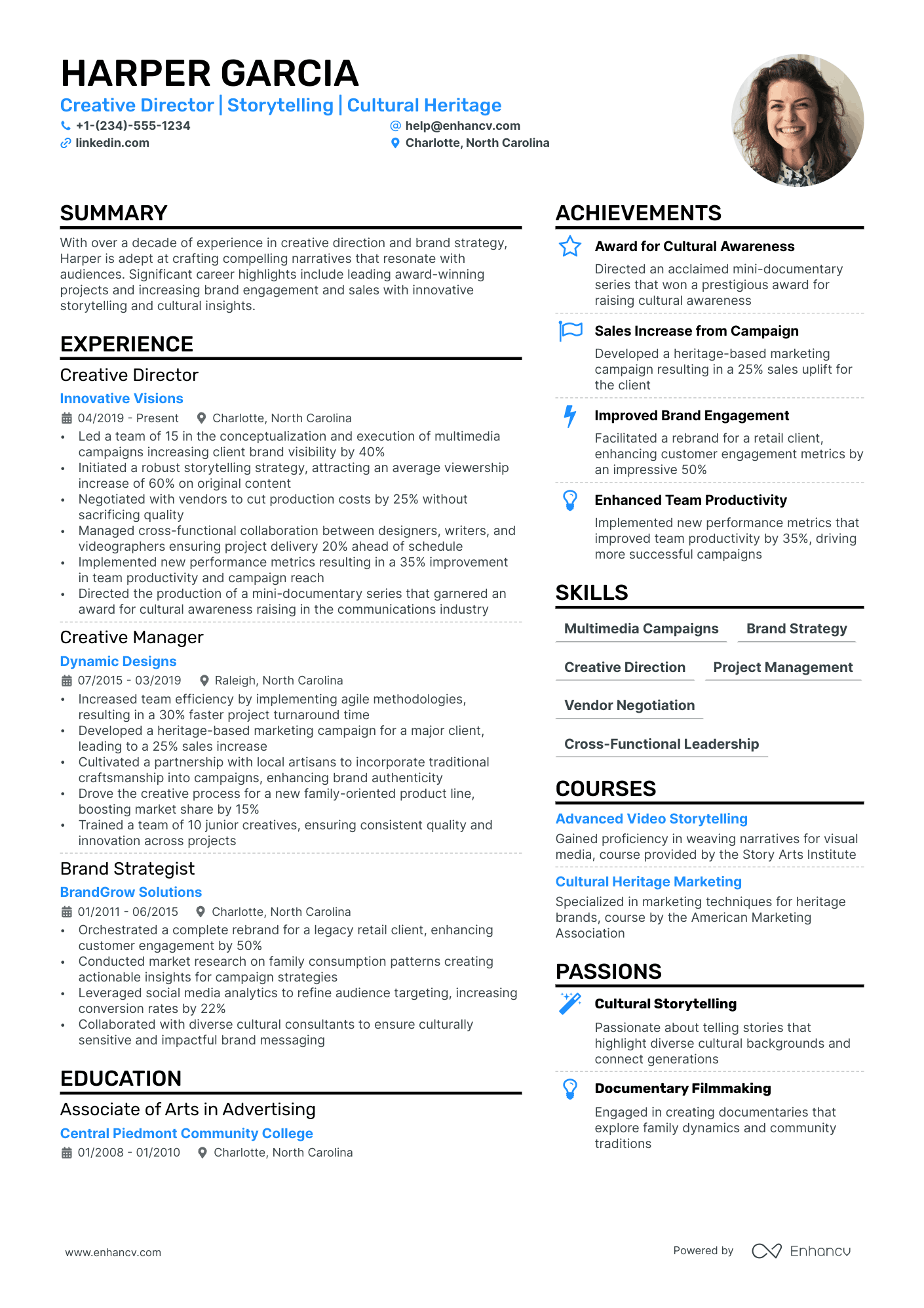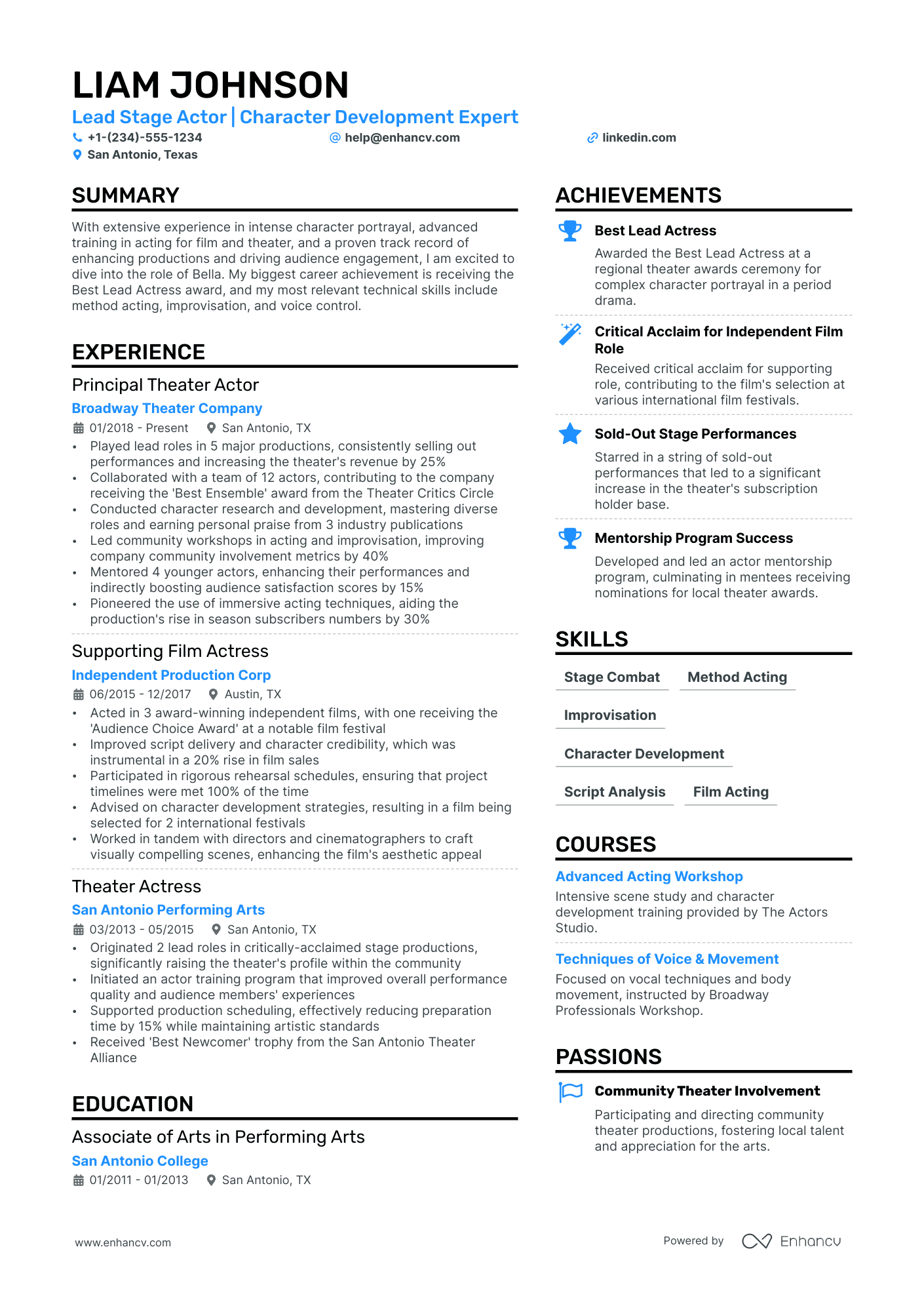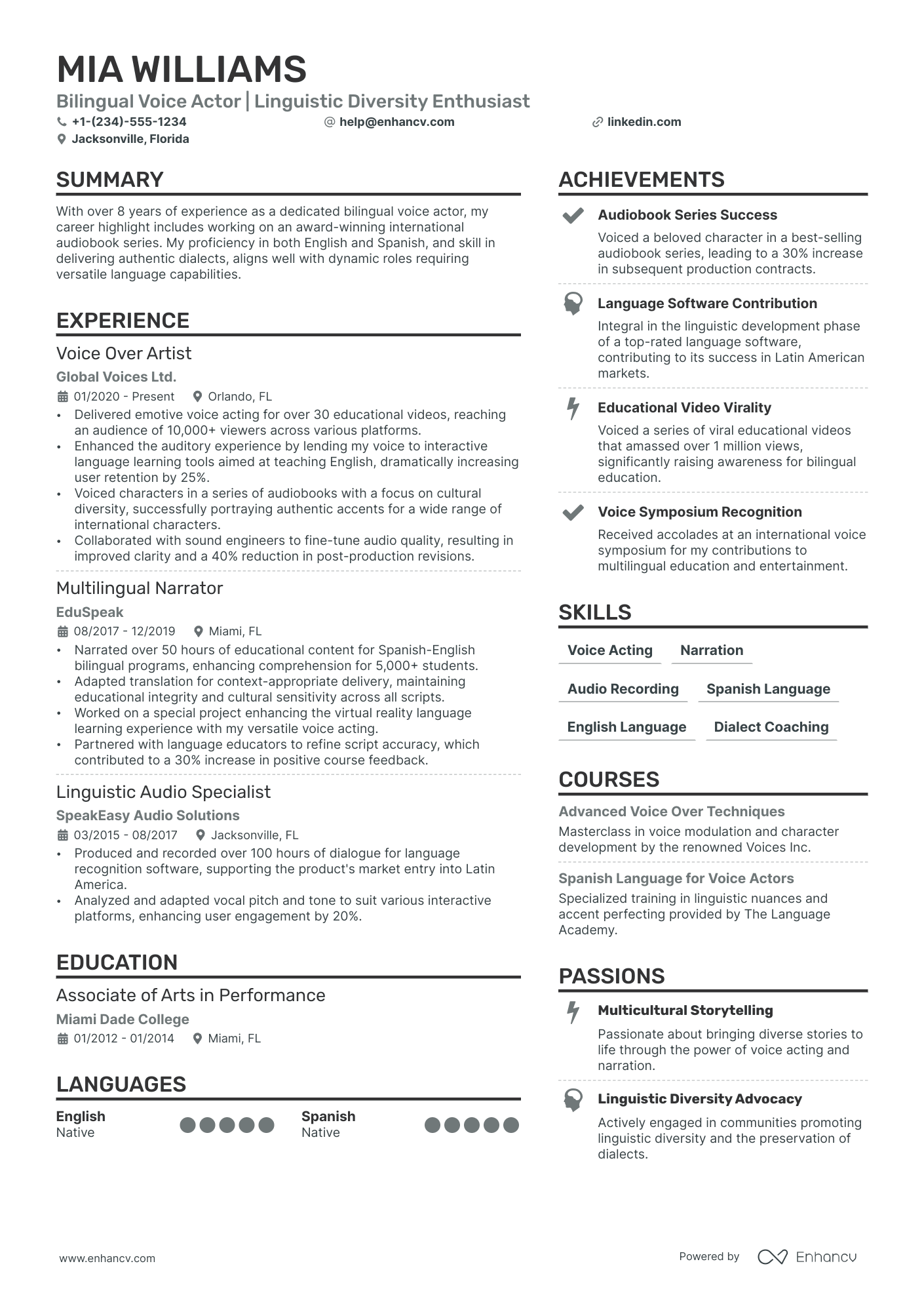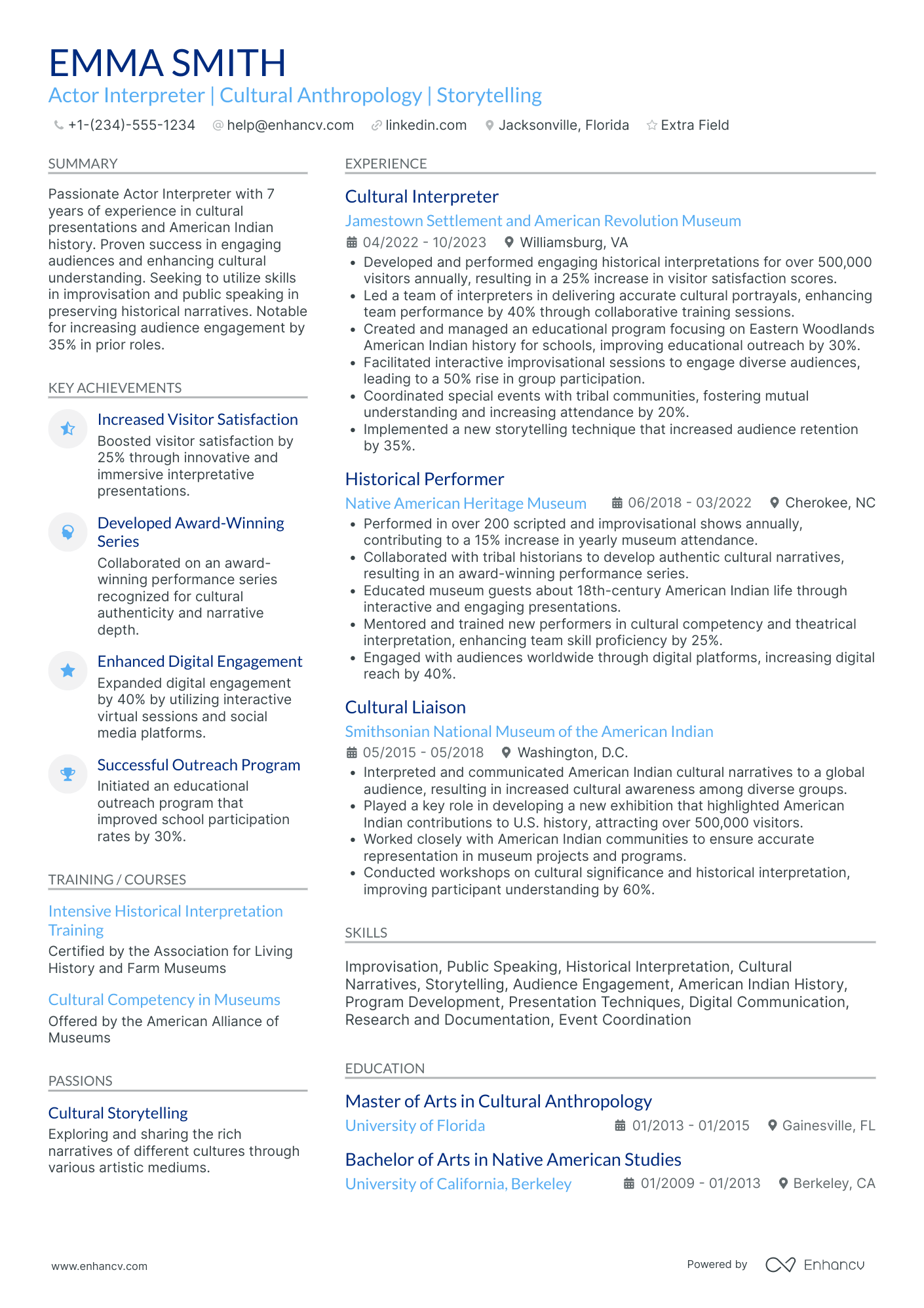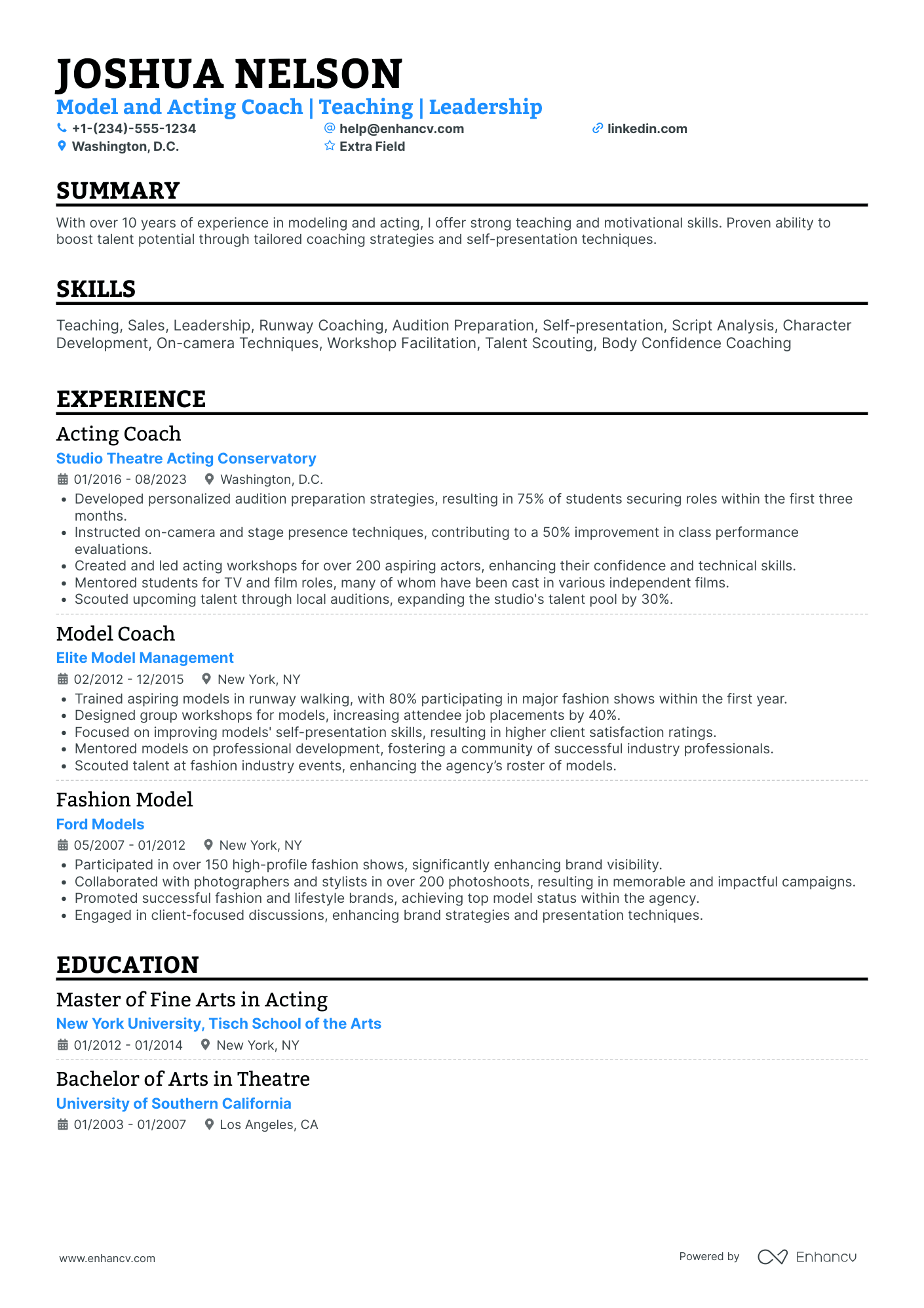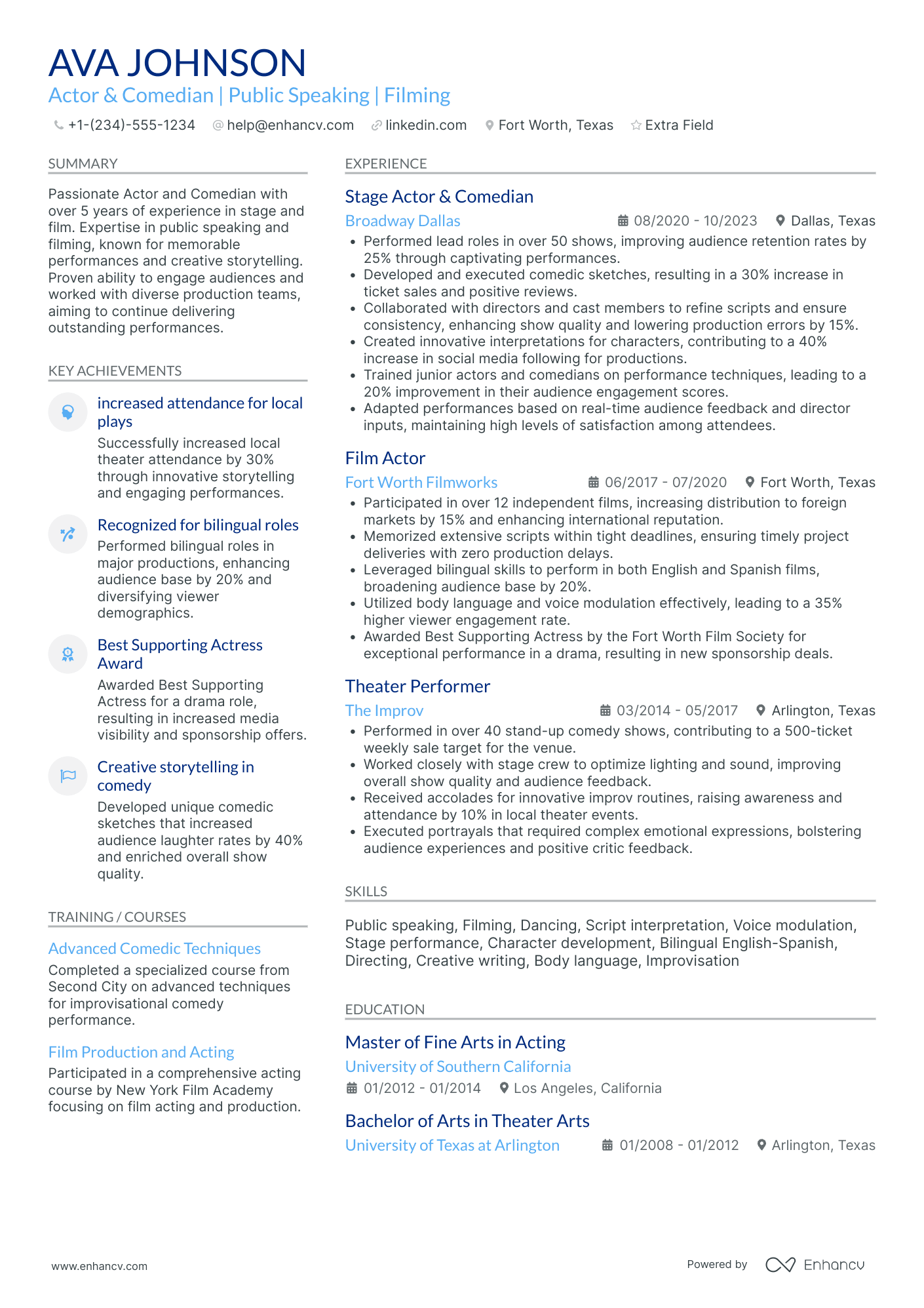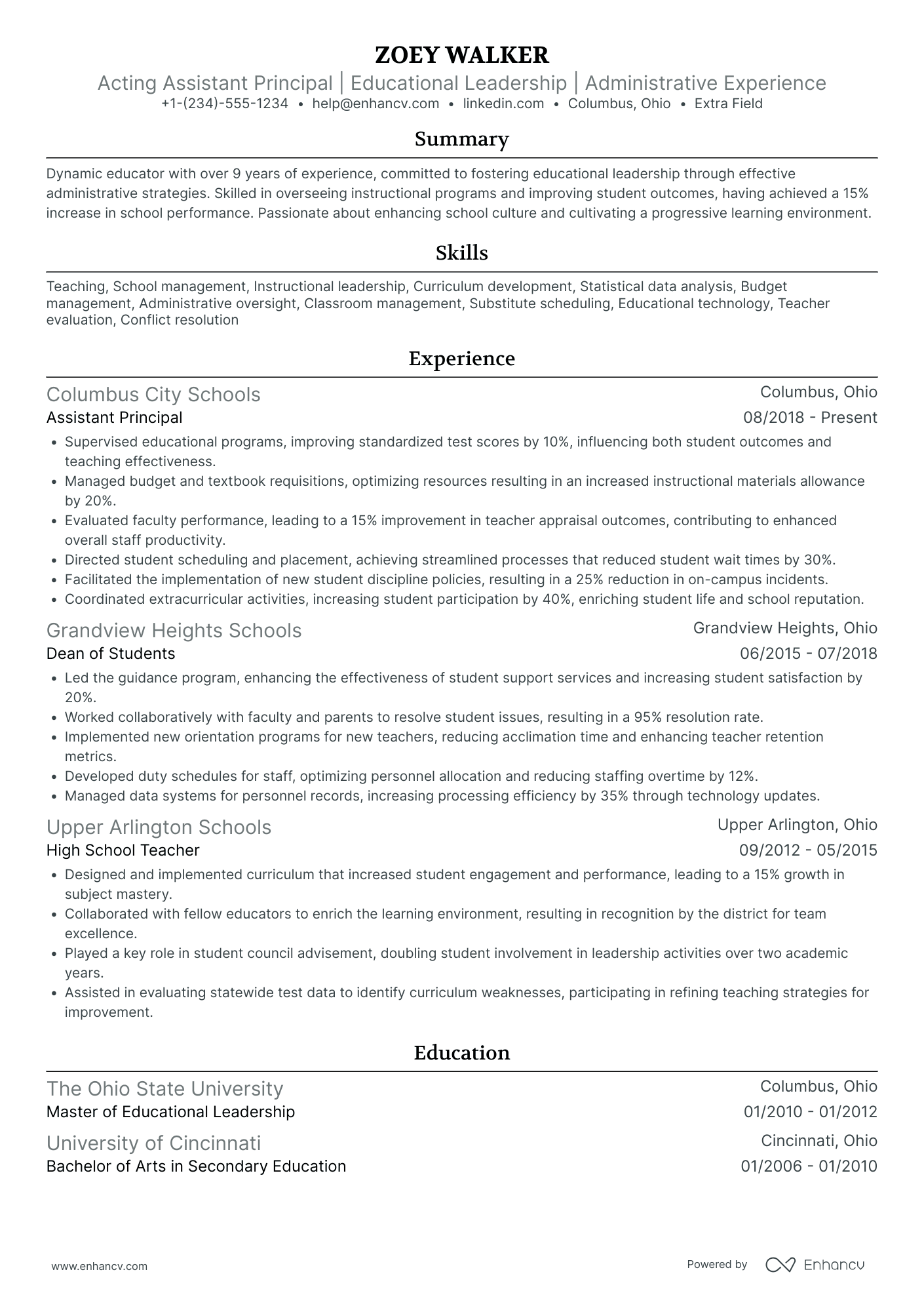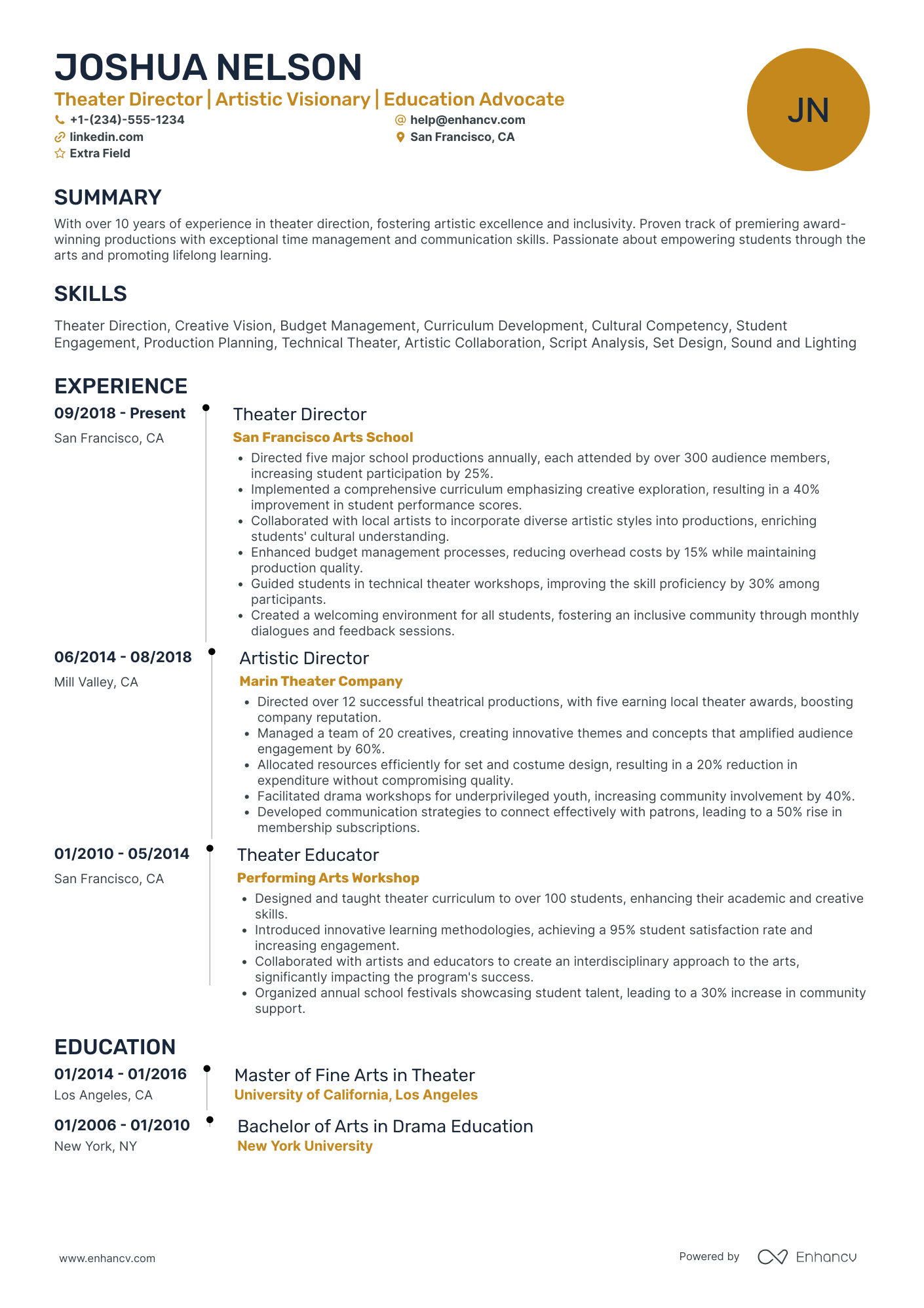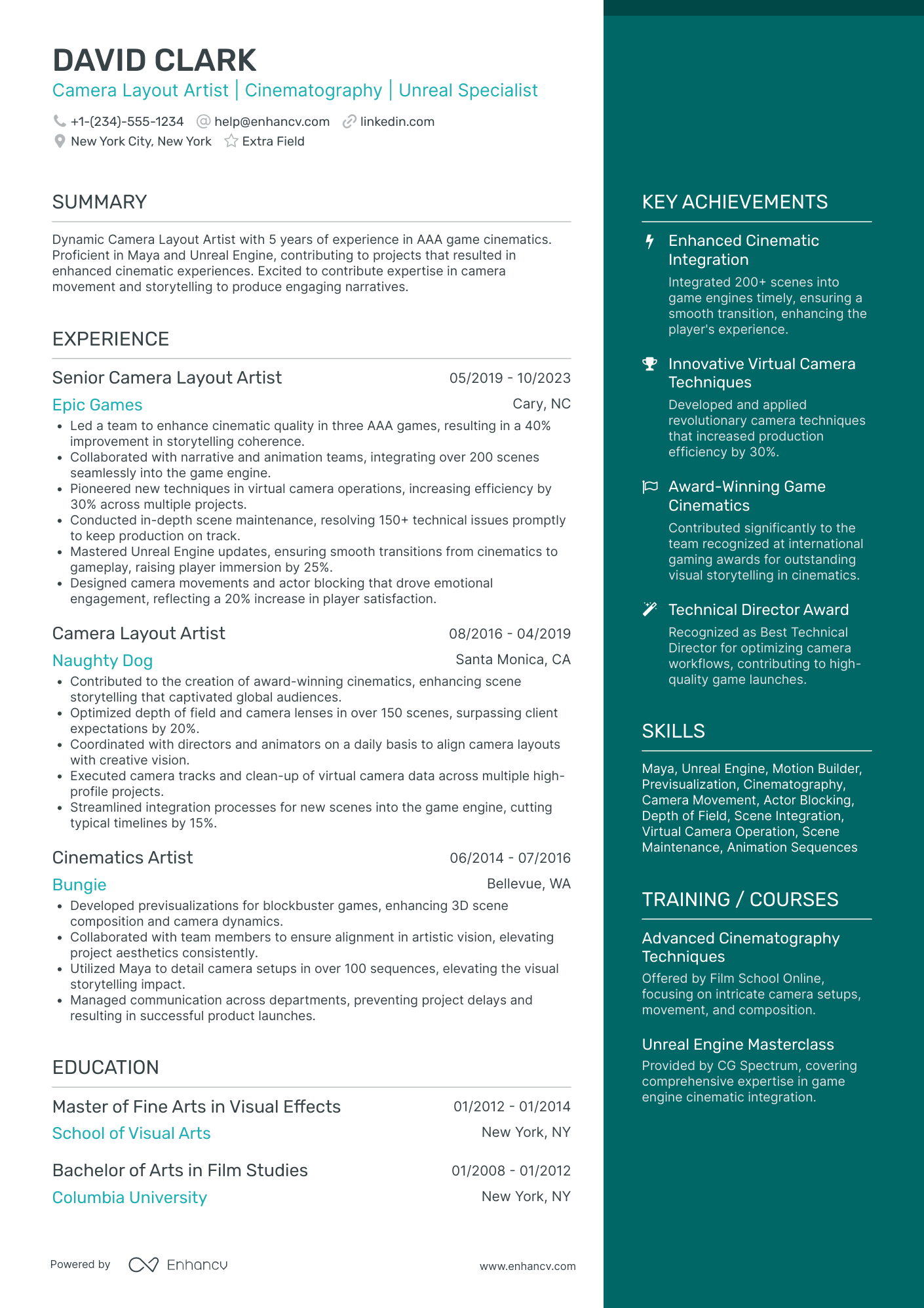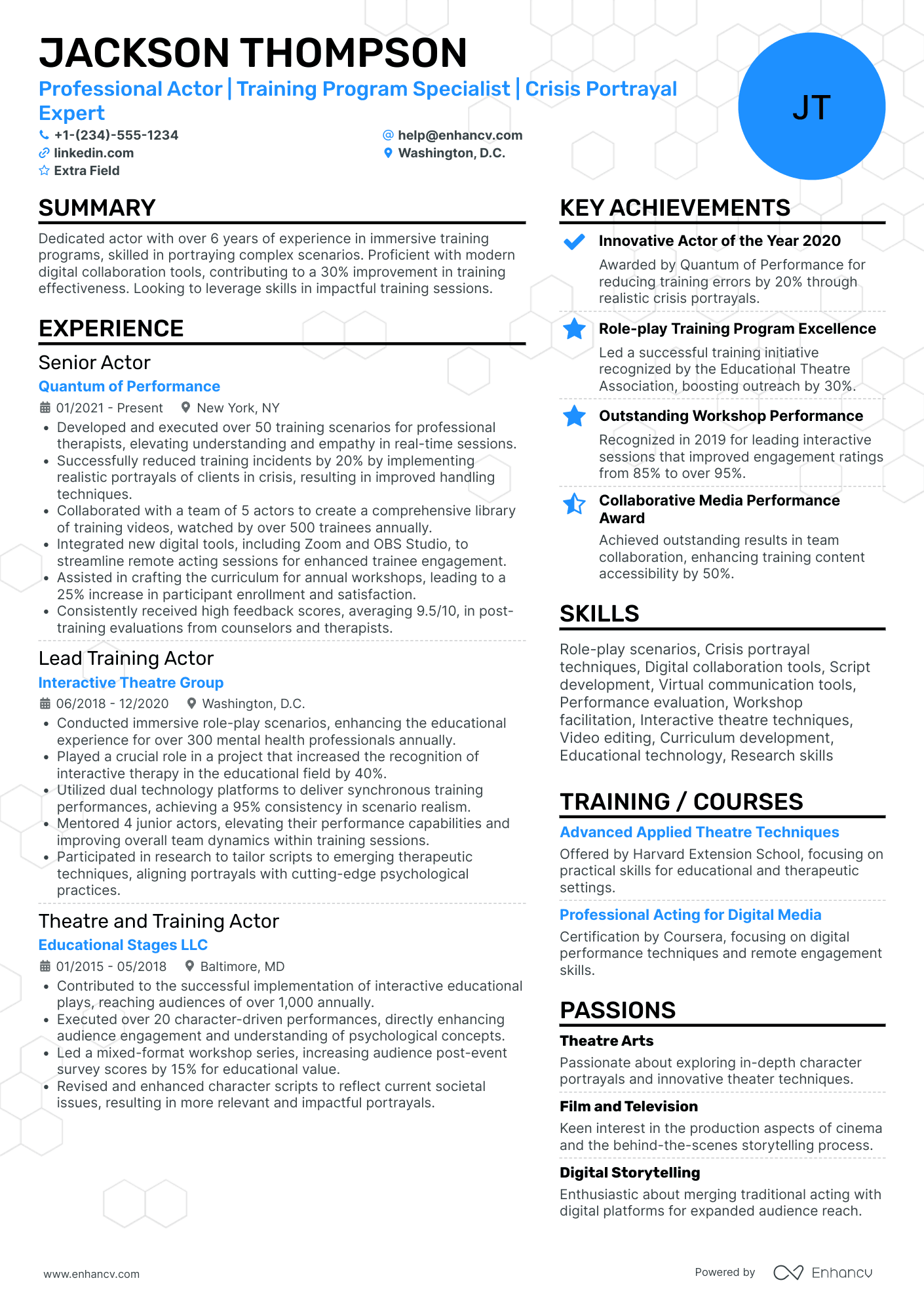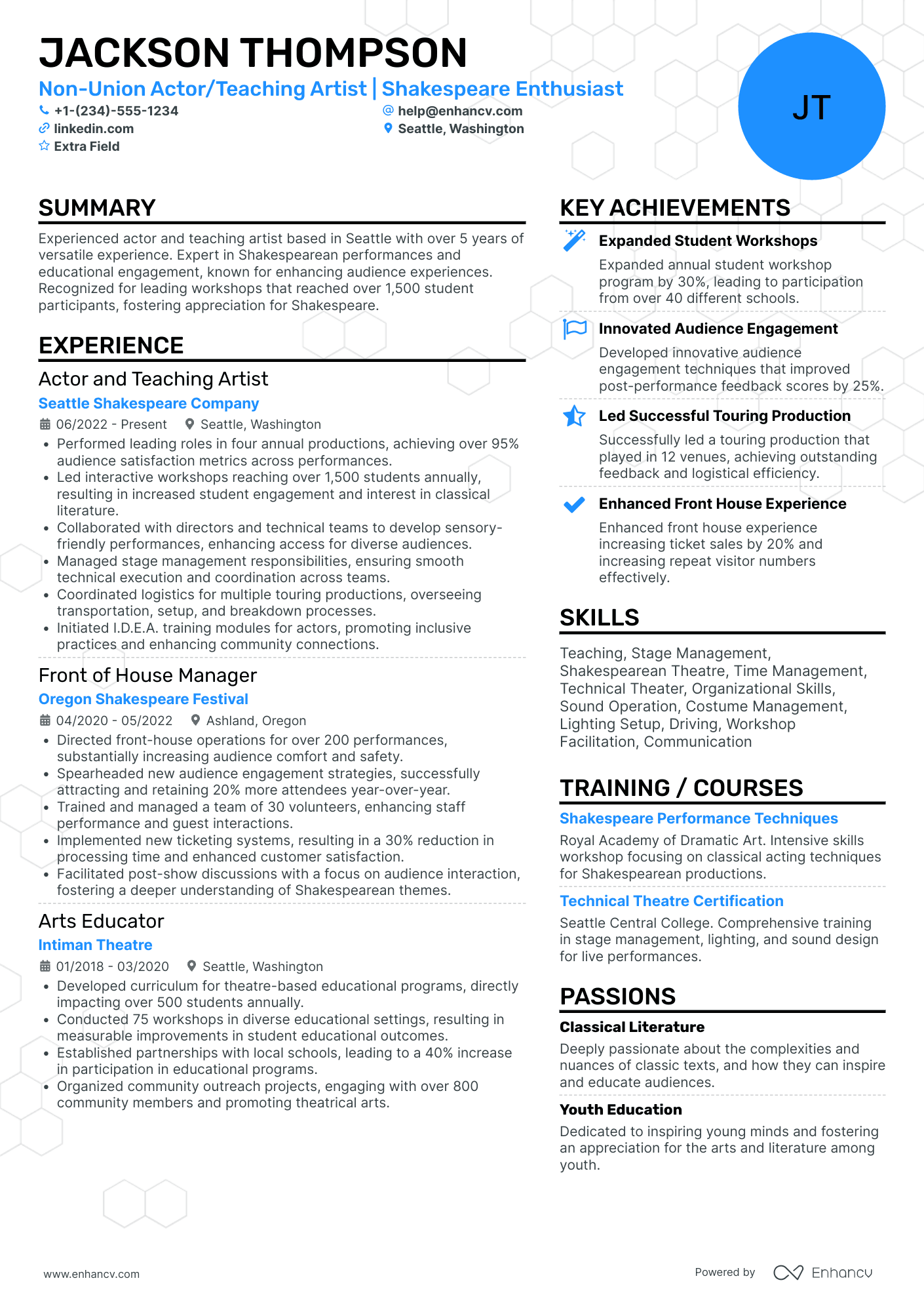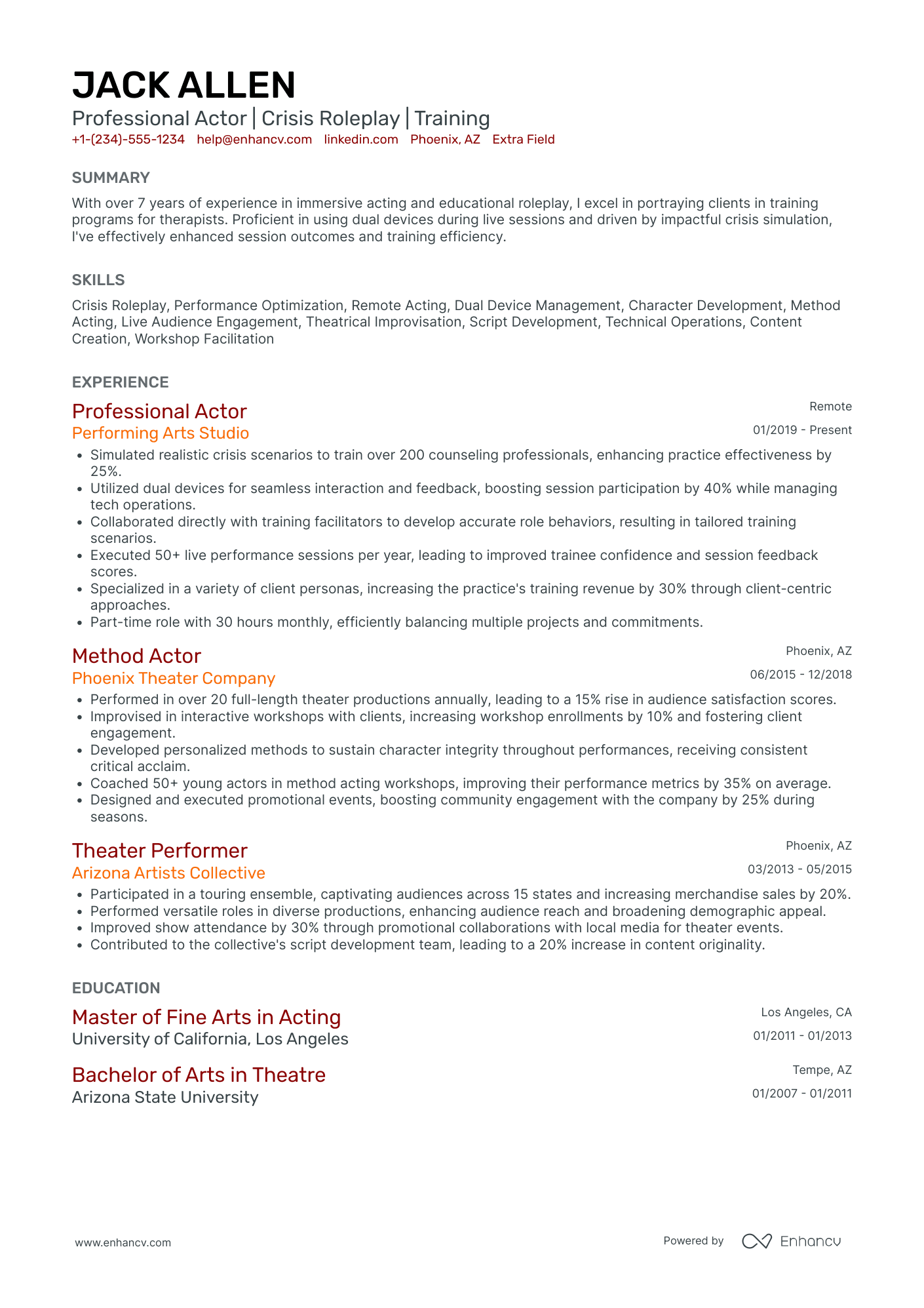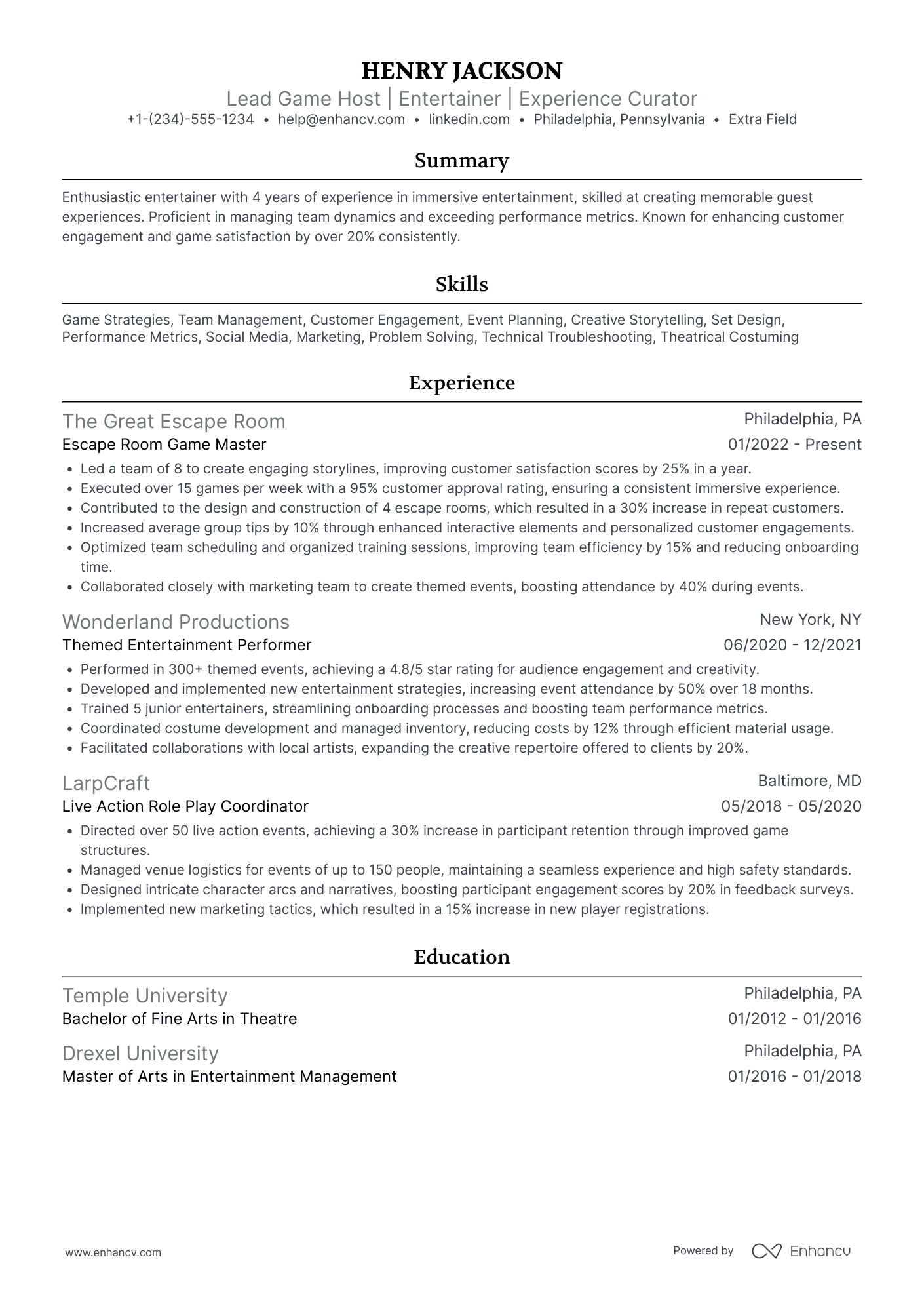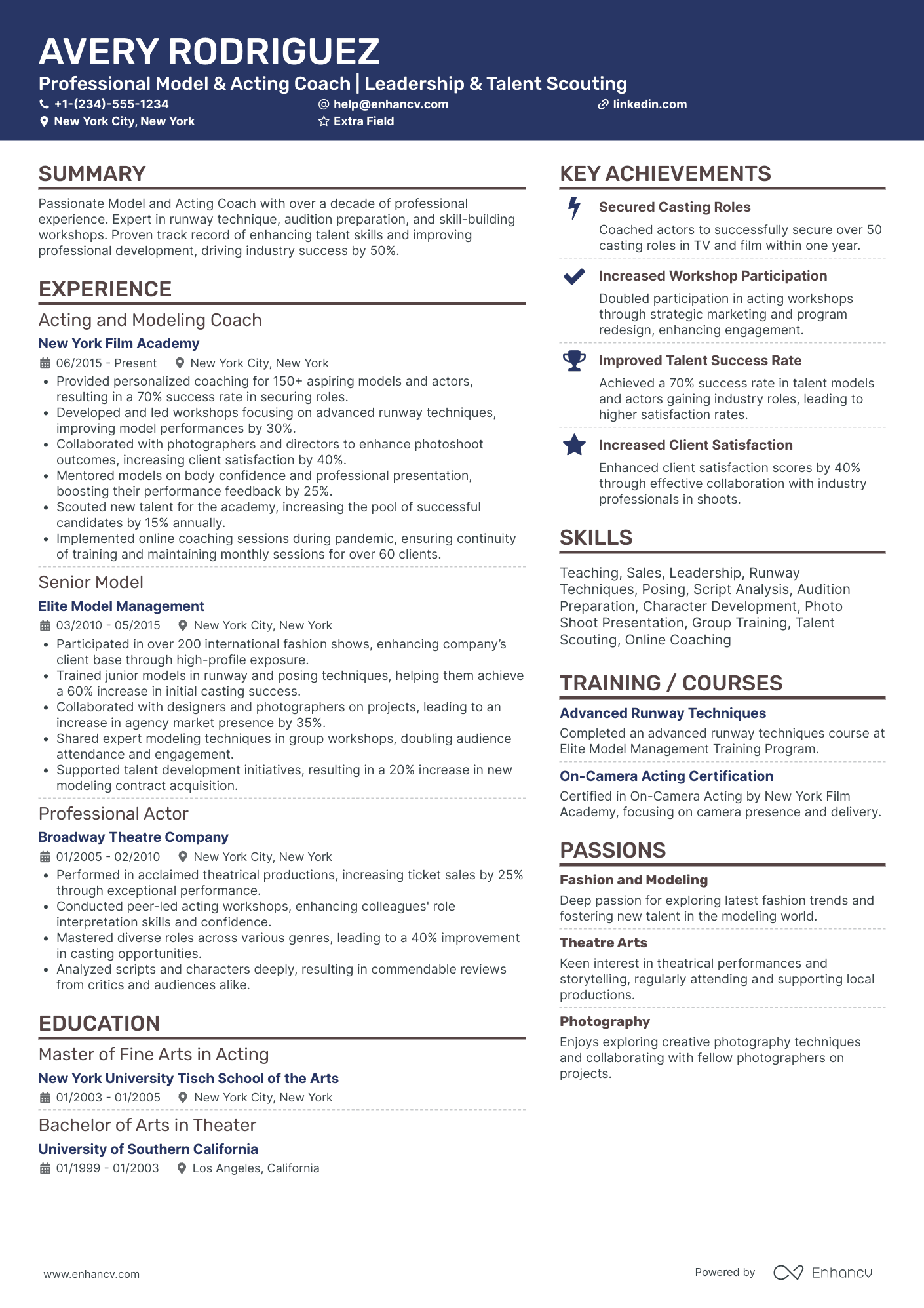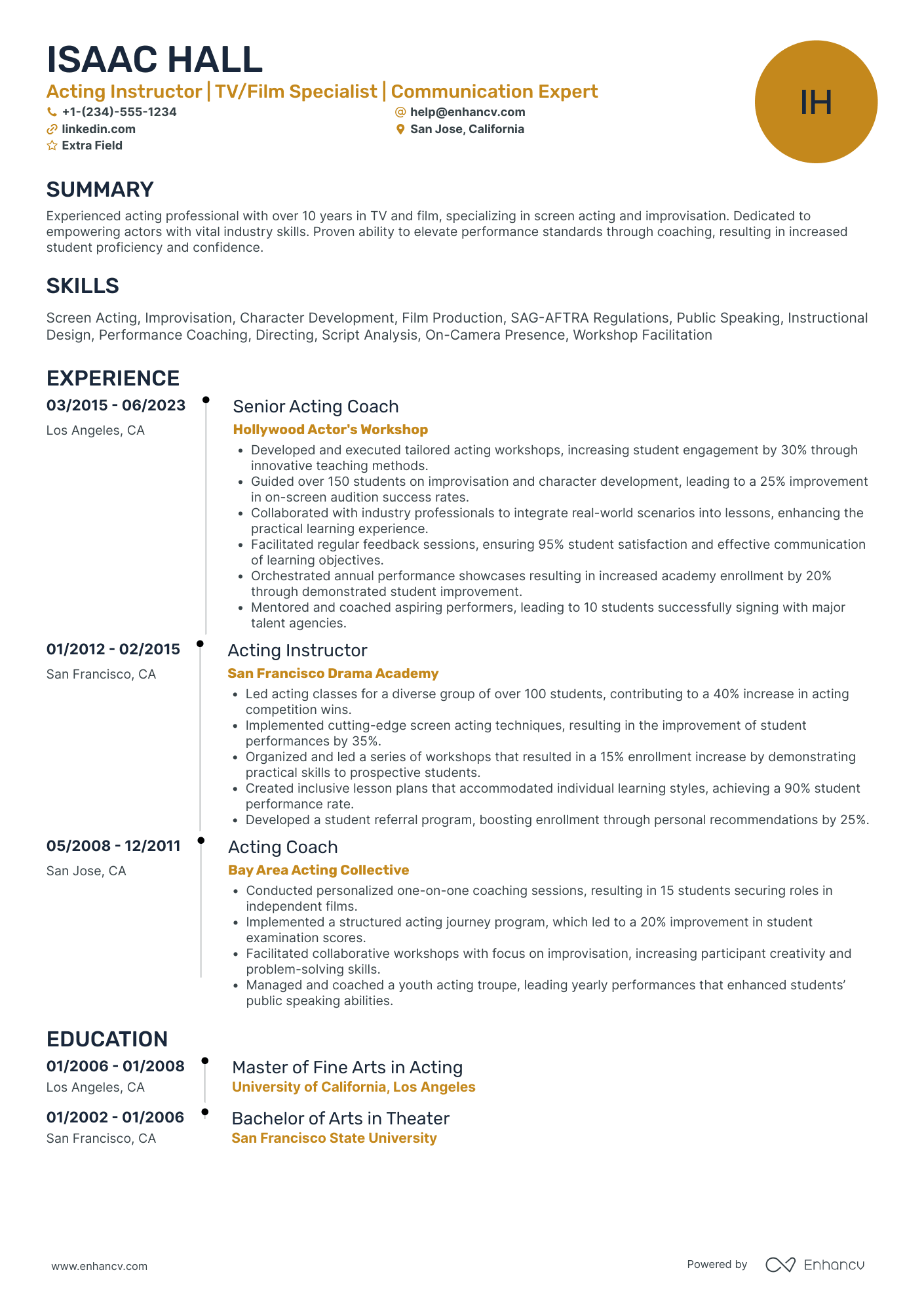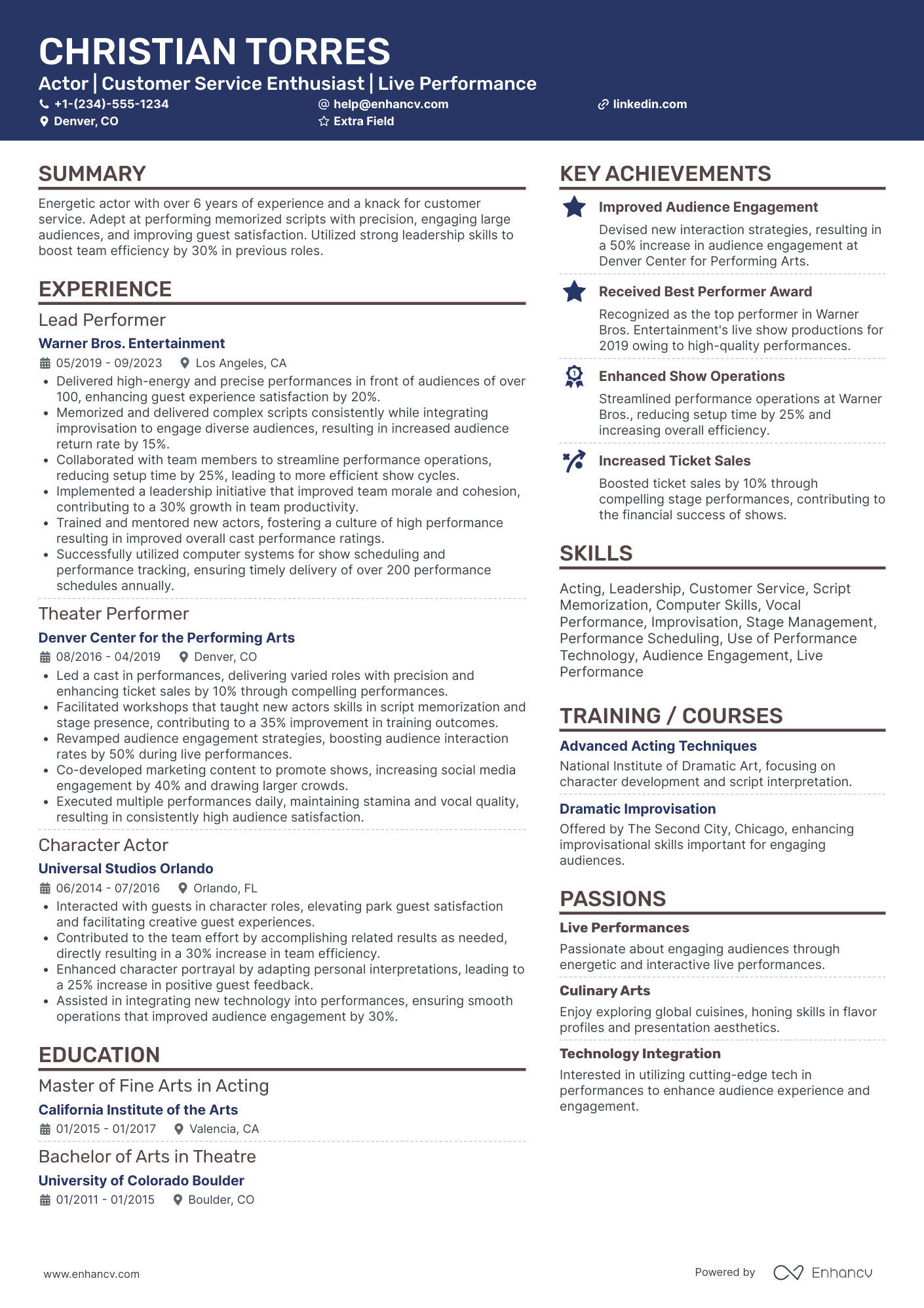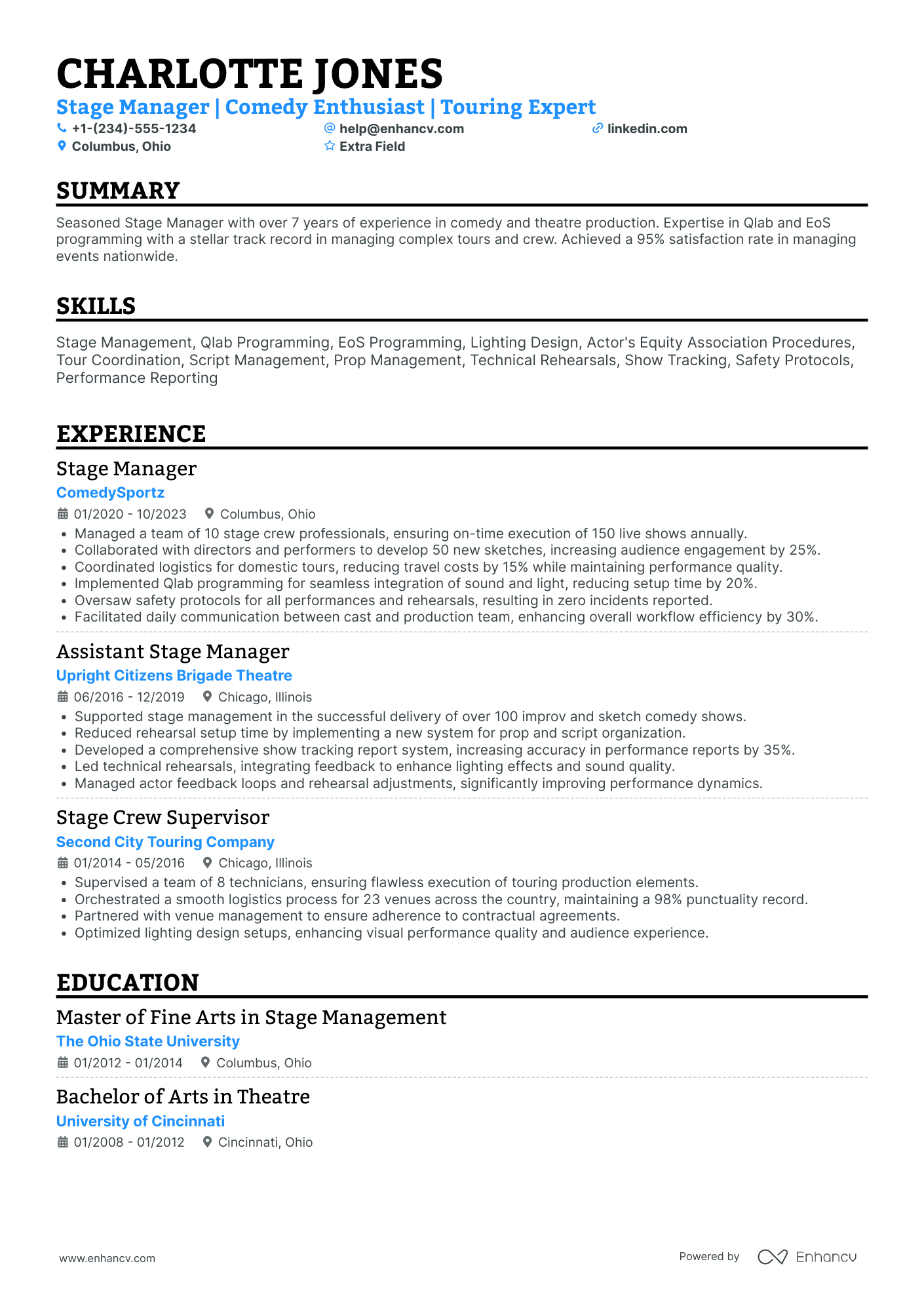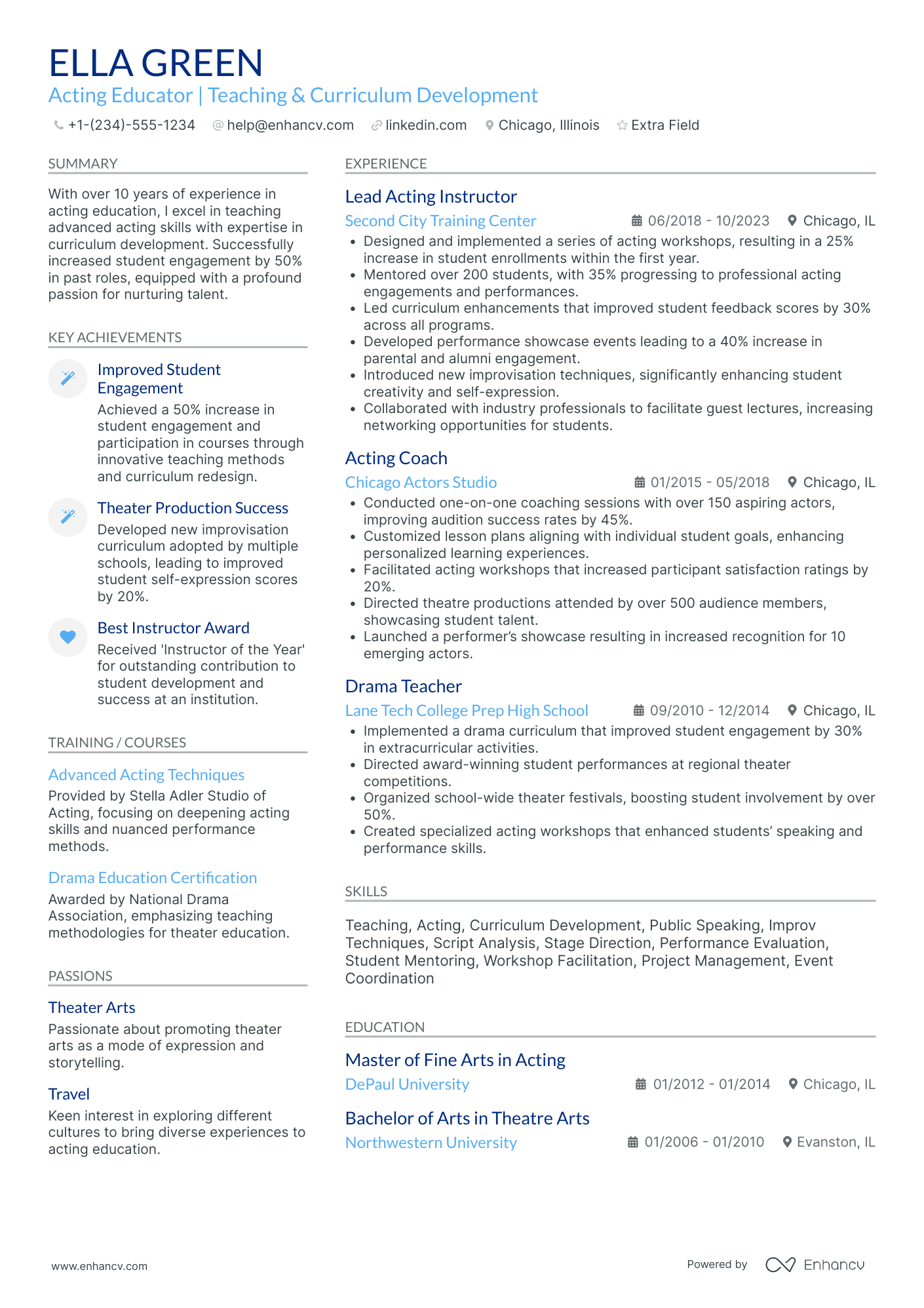No matter what side gigs you might be juggling as an actor—whether it's waitressing or delivering packages—you're always holding out for that breakthrough role. But are you prepared? Do you have a polished acting resume ready to hand over, or are you scrambling to update it
Time is ticking, and the industry waits for no one. You never know when the next big opportunity will come knocking. Instead of just waiting for an audition, make sure you're fully prepared.
Getting ready for your next audition isn't just about perfecting your monologue. Your actor resume needs to shine, too. So, here’s where we can help.
Key takeaways
- Place your physical attributes (like height, hair color, eye color) and your agent's contact details near the top of the resume for easy access.
- Group your acting credits by category—such as Film, Theater, or Voiceover—to clearly showcase your versatility across different mediums.
- Describe soft skills with specific examples to demonstrate your ability to work well in a team and adapt to different creative environments.
- Highlight your range by showcasing diverse roles and training.
- Tailor your resume to the role, focusing on the most relevant skills and experiences.
- Leverage optional sections like awards and special skills to give a fuller picture of your talents.
Now that you understand the importance of a polished resume, let’s look at an actor resume sample to guide you in creating your own.
Actor resume sample
Whether you're auditioning for a student film, a community theater production, or even a local commercial, you need a top-notch resume. It's your calling card that shows casting directors what you've done and what you're capable of, so always have it ready! Here's an actor resume template you can use for inspiration or customize to your needs on Enhancv's resume builder.
Mia Cruz
Professional actor
miacruz@enhancv.com @LinkedIn Dallas, TX
Height: 5'6" Eyes: Brown Hair: Black
Agent
Jane Bradshaw
bradshawj@enhancv.com (214) 555-1234 Dallas, TX
Summary
Energetic and versatile actor with experience in both professional and amateur settings. Skilled in delivering engaging and informative performances for a variety of media formats. Strong communication skills and a proactive approach to collaboration. Ready to leverage acting talents in a dynamic advertising environment.
Experience
Promotional Video actor
Dallas Media Productions
January 2022 - Present
- Delivered 90-second scripts (Fresh Start Fitness, TechEase Solutions, GreenLiving Essentials) with high energy and clear communication
- Worked with directors and editing teams to produce polished and compelling final products.
- Developed proficiency in using personal filming equipment, including cameras and lighting setups.
Community Theater Performer
Dallas Theater
September 2020 - December 2021
- Gwendolen Fairfax—"The Importance of Being Earnest" (Dir. Jane Smith)
- Hermia—"A Midsummer Night's Dream" (Dir. John Doe)
Education
Associate of Arts in Performing Arts
Dallas Community College
Graduated 2020
Certifications
Certificate in Digital Video Production
Dallas Media Institute, 2021
Skills
- Acting and performance
- Script reading and interpretation
- On-camera presence
- Video production techniques
- Collaboration and teamwork
- Time management and scheduling
Languages
- Bilingual (English & Spanish)
How to format an actor resume that tells a well-rounded story
To catch the attention of casting directors and land upcoming roles, you need to start with a proper format. The all-time favorite is the reverse chronological layout. It's the most recognizable resume format, showcasing your past roles and skills in a clear, concise manner.
However, since acting resumes differ from typical job resumes, you'll need to make a few adjustments. We'll dive into these modifications as we go through each resume section. For now, look at the most common elements of an actor’s resume:
- A detailed header
- Summary or objective
- Acting experience or credits
- Skills
- Education and training
- Awards and recognitions if any
So, let’s explore how you can translate your creativity into a clean and readable resume.
Resume design tips
- Set your margins around 0.5 to 1 inch. This keeps your resume neat and easy to read without feeling cramped.
- Stick to a clean, professional look with minimal colors. A classic black-and-white palette is always a safe bet. If you use color, keep it subtle.
- Choose a clean and legible font like Lato, Volkhov, or Bitter, sized 10-12 pt. Nothing too fancy or distracting.
- Use lines or columns to organize your information clearly. This is especially useful for listing roles, directors, or theater companies.
- Keep your resume to one page. You want to include your best work without overwhelming the reader. Stick to the highlights and most relevant experiences.
Contact details
Acting roles are different from regular jobs, so your resume header will need to be slightly different as well.
- List your full name, professional email and city and state at the top of the resume.
- Insert the URL of your website or portfolio showcasing your work. Some casting directors might ask for a demo reel, so if this is the case, you should prioritize it.
- Place a small headshot in the top of your resume. It should be high-resolution and professionally taken so it accurately represents your current look.
Be aware of location-based layout differences – Canadian resumes, for instance, might differ in format.
PRO TIP
Actors would normally be requested to staple their headshot to the back of the resume. Both documents should match in size, typically 8" x 10", the standard for headshots. This ensures a professional presentation and prevents any mismatched edges. Attach the photo securely to avoid losing it—using tape or paper clips can lead to the pieces getting separated. Lastly, use the same picture across all your professional materials, including your resume, online profiles, and business cards.
File formatting
- Name your resume file clearly, like "Mia_Cruz_Actress_Resume.pdf", so recruiters can easily identify it.
- Save your resume as a PDF so all your info remains intact after printing.
Not sure if you've got everything right? Try the Enhancv free resume checker which can help you spot mistakes and improve poorly drafted content, saving you time in the editing process.
Is your resume good enough?
Drop your resume here or choose a file. PDF & DOCX only. Max 2MB file size.
Before we get into more detail, let’s clarify another component of your resume that an actor can’t go without—your representation and personal attributes.
Personal stats and representatives
These details are crucial for an acting resume because they help casting directors quickly understand your look and who to contact for bookings, making it easier for you to land roles. This is how this information can look on a resume:
Agent’s contact information
Include your agent's or manager's name, phone number, and email address. You can do it in the resume header, or pick and customize one of Enhancv’s unique sections, just like the example below.
Physical attributes
List your height, eyes and hair color, using the Enhancv’s passions section and changing the name to Bio. Then put it somewhere at the top of your resume, between the header and the summary.
Moving on, let’s discuss the most prominent section of your resume—the acting experience.
How to write your actor resume experience
Unlike a traditional resume, you don't need to list your acting credits chronologically. Instead, organize your experience section by media type—such as Television, Film, Theater, or Voiceover—and its relevance to the role you're pursuing. Be sure to include the following details:
- Type of role: Specify whether it was a lead, supporting, extra, body double, stunt, etc.
- Name of the show: Clearly state the title of the production.
- Duration and location: Include the dates and place where the production took place.
- Director's name: Mention the director, especially if they’re well-known.
- Production company: Name the company behind the production, providing context for the scale and type of the project.
Keep a separate resume for commercial work. Commercial credits can influence casting decisions due to potential conflicts with brand affiliations. Mention that you have a commercials resume available upon request at the bottom of your acting resume.
Let’s see how you can create an experience section for your resume based on a real-world job posting.
Actress, Female Lead
Company details
Prod House 8
D.C., Director; Vijay S., Producer
Casting "The Stand-in," an upcoming drama for online streaming. Note: Must be local to Los Angeles area.
Storyline
Years after being wronged by her doppelganger Katherine, Annie is determined to infiltrate Katherine's life and dismantle her world from within.
Annie/Katherine
Lead. Female. 18-30
Seeking an actress capable of playing both roles of Annie and Katherine, or two identical twins. Annie and Katherine are visually identical, but are rivals with contrasting personalities.
Bonus points if you have an identical twin.
Annie: intelligent, timid, and patient
Katherine: boisterous, impulsive, often puts her own interests above others.
Ethnicity: White / European Descent
Required Media: Headshot/Photo
Below is the part of the experience section that best reflects the candidate’s suitability for the lead role in “The Stand-in”.
- •Double Take Productions
- •Mask Entertainment
The entry showcases the actress's experience in playing dual roles with contrasting personalities, which is exactly what's required for the characters of Annie and Katherine. The involvement in a documentary and reality show also spotlights her versatility and ability to engage audiences, essential for portraying complex characters in a drama setting. Plus, mentioning directors’s names demonstrates her experience with professional production environments.
PRO TIP
Create a sheet with all your roles, divided by category. Keep it as a living document and update it regularly. This will make it easier for you to pick and choose what to include when creating a new resume.
If you don’t have any acting credits at all, don’t worry! Many actors and actresses have been casted without any experience. That’s why it’s important to show up and be ready with a standout resume. Read on to learn what you can do in this case.
How do i write an actor resume with no experience
Even if you're new to acting, your resume should still include key details like contact information, physical attributes, and skills, just like experienced actors. Here’s what else to add:
- Use a functional resume format to underline relevant or special skills (eg. dialects and accents or stage combat) and de-emphasize the lack of direct experience. Don’t exaggerate, just provide concrete proof of your capabilities.
- Highlight any acting-related classes, workshops, or training, even if they aren't formal programs.
- Include skills relevant to acting, such as public speaking, dance, singing, or languages.
- Mention community theater, school plays, or other performance-related activities that demonstrate your interest and commitment.
- Note any hobbies that showcase creativity or skills that might be relevant to acting roles, like writing or playing an instrument.
Beginner actor resume objective
An objective statement sets the tone for your resume and immediately tells casting directors what you bring to the table and your career goals. It's your chance to make a strong first impression, even if you don't have extensive experience.
Here’s how to craft yours:
- Briefly (3 sentences at most) express your enthusiasm for the craft and your commitment to pursuing a career in acting.
- Specify what you aim to achieve in the industry, such as gaining experience in film, theater, or a specific genre.
- Highlight any unique skills or characteristics that make you stand out, such as strong improv abilities, a knack for physical comedy, or bilingualism.
Now, take a look at a good example from a voiceover actor’s resume:
Whatever your experience level, you need to have a strong and convincing skills section. We tackle the details below.
Optimize your resume summary and objective for ATS
Drop your resume here or choose a file.
PDF & DOCX only. Max 2MB file size.
How to list acting skills on a resume
For an actor's resume, it's crucial to balance technical and social skills, focusing on those most relevant to the role. However, acting can often blur the line between hard and soft skills, so keep the following in mind when building your resume:
- Highlight the skills most important for the role you're applying for, as specificity helps you stand out.
- List any acting techniques or methods you're trained in, and link them to relevant workshops or courses to provide verifiable credentials.
- Mention your preferred acting methods upfront to give casting directors insight into your approach to roles.
Matching keywords from the job posting on your resume can significantly increase your chances of getting noticed, as it shows you have the specific skills and experiences that casting directors are looking for.
Here’s a list of the most common hard skills that can be seen on an acting resume:
Best hard skills for your actor resume
- Meisner technique
- Stanislavski method
- Chekhov technique
- Uta Hagen technique
- Alexander technique
- Viewpoints
- Improvisation
- Stage combat
- Dialects and accents
- Voice modulation
- Physical theater
- Classical acting
- Mask work
- Puppetry
- Method acting
- Laban movement analysis
- Scene study
- Cold reading
- Gun handling
- Horse riding
- On-camera technique
- Musical theater performance
Putting the spotlight on the soft skills section of your resume needs some quantifiable results. To decide which interpersonal skills to include here, think about how your work outside acting has affected those around you:
- Do you take good directions?
- Can you work well with other actors?
- How thorough are you when preparing for a new role?
- Where do you take your inspiration from?
- Can you inspire those around you?
Have these questions in mind when building the strengths section of your resume. And if there are others who can vouch for your professionalism, reference them. Testimonials from industry experts will always go a long way.
Here are some of trendiest people skills in 2025:
Best soft skills for your acting resume
- Communication
- Emotional intelligence
- Adaptability
- Collaboration
- Creativity
- Time management
- Confidence
- Attention to detail
- Resilience
- Listening skills
- Memorization
- Improvisation
- Empathy
- Patience
- Self-motivation
- Problem-solving
- Leadership
- Teamwork
And below is an example of how you can explain and describe your interpersonal skills on your resume using the Passions component and adapting it to your needs.
Moving on, let’s clarify when you should put educational details on your resume and how to do it properly.
How to list your education and certifications on a resume
Not every actor has formal training, and many get by on raw talent and motivation. But if you've got some education under your belt, flaunt it! Got an acting degree? List out the classes you've taken, like classical singing or contemporary dance.
For those without formal schooling, here's how you can still shine:
- Acting workshops
- Studio classes
- Seminars and masterclasses
- Private coaching (bonus points if your coach is a big name)
- Training in music, dance, singing, combat, martial arts, stunts, etc.
- Accents and dialects coaching
These show you're serious about your craft and help you set yourself apart in auditions. Look at the right way to list them below:
- •Completed courses in Classical Acting, Voice and Speech, and Movement
- •Participated in the university's annual theater festival
Definitely include an education section on your resume if you have special acting training or if a degree is specifically mentioned in the job description. It’s not always necessary, but when it is, make sure your degree, the school you attended, and any relevant coursework are clearly listed. This way, casting directors can quickly spot your formal training and qualifications.
Wondering if you need to include any certificates in your resume? Sure, as long as they’re relevant to the character you’re auditioning for.
If you’re doing a musical and you have a singing and dancing certificate, include it. If you’re auditioning for a medical TV show and have an EMT certificate, mention it. This will add credibility to your character. Because you’ll know what you have to do as a medical professional.
Here are some impressive credentials you can consider:
Best certifications for your actor resume
Now, let's move on to the final piece of the puzzle: the actor resume summary.
How to write your actor resume summary
As an actor, you've probably imagined yourself on the Tonight Show and rehearsed your personal story in front of the bathroom mirror countless times, right? Here’s an opportunity to do something similar and use it to earn you an audition. But what does this resume summary look like?
A summary is a short paragraph of 4-5 sentences. It highlights your biggest achievements. In the text, focus on the following points:
- Years and type of acting experience
- Biggest professional accomplishments
- Acting systems mastered
- Any special skills, which not only look good on your resume, but are perfect for the role
This may seem like a lot, but don’t get overwhelmed! Have a look at the sample summary that’s targeted to the job posting we provided earlier:
This summary is strong because it highlights the actress's relevant educational background and specialized training. It also includes specific certifications and experience which reassures casting directors of her qualifications and readiness for immediate casting.
With the core sections covered, let's dive into the additional sections that can enhance an actor's resume and make it stand out.
Extra sections for an actor's resume
Adding optional sections to your resume can highlight unique skills and experiences that set you apart, especially for a role like this that demands versatility and a strong presence. Some of them include:
- Awards and recognitions: Show off any awards or accolades you've received in acting, as they demonstrate your talent and industry recognition.
- Professional affiliations: Mention any memberships in acting guilds or organizations, like SAG-AFTRA, to underscore your commitment to the profession.
- Social media links: Casting directors may want to preview your social media conduct.
- Language skills: Listing languages you speak can be a huge asset, especially if the role requires a particular accent or if the production involves characters from diverse backgrounds.
In conclusion
In this guide, we've set the stage for crafting a show-stopping actor's resume, covering everything from your best performances to the nuances of your skillset. Just like nailing your audition, your resume should captivate casting directors and leave them eager for an encore.
Actor resume examples
By Experience
Drama School Actor
By Role
Background Actor
Commercial Actor
Commercial acting is a specialized area within the acting industry. It requires a distinct set of skills not typically utilized in film or theater, making it essential to tailor your resume to reflect these specifics.
Below are some elements you should incorporate into your resume when applying for commercial acting opportunities:
- The nature of commercial acting usually requires the ability to effectively pitch a product or service within a brief timeframe. Highlight any experience you have in this aspect.
- Emphasize your familiarity with the commercial acting field and its dynamic nature. Showcases your adaptability to swiftly changing project timelines and objectives will be of interest to potential employers.
- Provide specific instances where your role in commercials has significantly added to the success of the project. For instance, mention if your performance substantially boosted product or service sales.
- Rather than merely enumerating commercials you've featured in, describe how your work has positively influenced the brand or marketing initiatives. Where possible, cite specific accomplishments in a 'role-action-result' format.
Film Actor
Include experience with character development, improvisation, and any other techniques pertinent to film acting.
Highlight any notable filmography and roles you have undertaken. Position these experiences in such a way that it tells a story about your versatility and commitment to your craft.
Focus on how your acting performances have contributed to the film's success. This can be box office figures, critical acclaim, or audience approval. It's essential to demonstrate the impact of your talent on the film's overall achievements.
Rather than just listing previous roles, connect them with the success or strength you managed to bring to these projects following the 'role-action-result' framework.
Voice Actor
A range of vocal skills is key in voice acting, everything from accents and imitations to an ability to portray emotions with your voice. Highlight your vocal skills and experiences where you've used these abilities.
Emphasize your understanding of the recording process and equipment. Good voice actors need to be comfortable with the technical aspects of recording their voice.
Recognize the distinction between various voice acting roles you've done like video games, advertising, animated series, and demonstrate the versatility and adaptability of your voice.
Don't just list your experiences; link them with the results you accomplished in those projects. For example, 'my character voice led to increased engagement in the video game', following the 'role-action-result' pattern.
